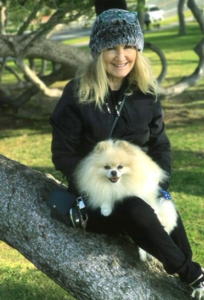 When Laura Abb was diagnosed with breast cancer in 2020, it came as a total shock. After all, Abb thought she was in good health, and never anticipated receiving the terrifying news that would have life-changing implications on the grandmother of two.
When Laura Abb was diagnosed with breast cancer in 2020, it came as a total shock. After all, Abb thought she was in good health, and never anticipated receiving the terrifying news that would have life-changing implications on the grandmother of two.
“You never think it will happen to you,” said Abb, who’s in her early 70s. “When I found out I had breast cancer, it had a profound impact on me, both physically and mentally.
But today, following chemotherapy, a double mastectomy and a commitment to maintaining a healthy lifestyle focusing on healthy eating, managing her weight and exercising, Abb is cancer-free, and plans to remain so. With June being National Cancer Survivor Month, Abb has a simple message to her family members, friends and the public at large: “Do everything you can to protect your health and prevent diseases, including cancer. It’s within your power to do so, and that starts with some simple lifestyle changes.”
Those lifestyle changes involve eating right, managing your weight and exercising regularly, as that has proven to significantly protect one’s health against disease, including many forms of cancer, according to Dr. Rashmi Menon, an oncologist with Kaiser Permanente Southern California.
Dr. Menon noted a diet based on less consumption of red meat and processed food, a higher intake of fiber, vegetables and lean meats that include fish and chicken reduce a person’s risk of developing many forms of cancer, including breast and colon cancer. She also encouraged 150 minutes per week of moderate exercise such as brisk walking, or 75 minutes a week of vigorous exercise such as aerobics or jogging.
“If you adopt these lifestyle changes, you will have a lower risk of developing cancer and many other diseases,” Dr. Menon explained. “At any point in time, there’s a benefit to eating healthy and exercising. Even after one develops cancer, the outcome will be improved if you’re able to reduce your weight and start exercising.”
Dr. Menon noted the suggested daily caloric intake for men should not exceed 2,400 calories, or 2,000 calories for women.
As for Abb, adopting a healthier lifestyle has paid off, and has helped her remain cancer-free.
“I feel great, I’m living life to the fullest, and I feel reinvigorated and have more energy,” she said. “I want to help my body fight any future illness, including cancer, and adopting a healthy lifestyle makes a huge difference when it comes to staying health, not just for cancer, but for everything. It’s a commitment worth taking and the benefits to your health are indisputable.”











